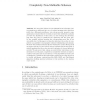Free Online Productivity Tools
i2Speak
i2Symbol
i2OCR
iTex2Img
iWeb2Print
iWeb2Shot
i2Type
iPdf2Split
iPdf2Merge
i2Bopomofo
i2Arabic
i2Style
i2Image
i2PDF
iLatex2Rtf
Sci2ools
ICALP
2005
Springer
2005
Springer
Completely Non-malleable Schemes
Abstract An encryption scheme is non-malleable if the adversary cannot transform a ciphertext into one of a related message under the given public key. Although providing a very strong security property, some application scenarios like the recently proposed key-substitution attacks yet show the limitations of this notion. In such settings the adversary may have the power to transform the ciphertext and the given public key, possibly without knowing the corresponding secret key of her own public key. In this paper we therefore introduce the notion of completely non-malleable cryptographic schemes withstanding such attacks. We show that classical schemes like the well-known Cramer-Shoup DDH encryption scheme become indeed insecure against this stronger kind of attack, implying that the notion is a strict extension of chosen-ciphertext security. We also prove that, unless one puts further restrictions on the adversary’s success goals, completely non-malleable schemes are hard to constru...
Corresponding Secret Key | Encryption Scheme | ICALP 2005 | Public Key | Theoretical Computer Science |
Related Content
| Added | 27 Jun 2010 |
| Updated | 27 Jun 2010 |
| Type | Conference |
| Year | 2005 |
| Where | ICALP |
| Authors | Marc Fischlin |
Comments (0)

